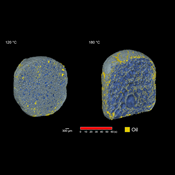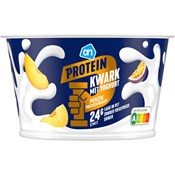


A single source of protein for alternative, vegan products does not exist. Every application calls for different functionalities, flavours and nutritional properties, says researcher Keshia Broucke, of the ILVO and the Food Pilot, emphatically.
Un produit donné requerra ainsi une bonne capacité moussante, tandis que pour un autre, la protéine devra pouvoir s’émulsifier ou gélifier. « De nombreuses recherches sont en cours pour identifier toutes les propriétés des protéines provenant de sources alternatives, ainsi que l’impact des processus d’extraction des protéines », explique Keshia Broucke, de l’institut de recherche ILVO et de la plateforme d’innovation Flanders’ FOOD.
A Combination of Proteins
Every application requires a combination of proteins, explains the researcher. “Many plant-based, protein-rich, raw materials are short of one or more essential amino acids, which can lead to deficiencies from a nutritional point of view.” Peas, chickpeas, lupin beans and many other pulses are short of essential, sulphur-rich amino acids, and so a grain protein supplement is recommended. Most grains are short of lysine, which is abundantly present in most pulses.

Sensory
There are also sensory limitations with some raw materials. "Proteins from nuts and seeds, such as pumpkin seeds and sunflower seeds, have a nutty flavour, which can be desirable in cookies and biscuits. However, pumpkin seed proteins have an intense green colour, and sunflower seed proteins are generally dark in colour. Also, their amino acid profiles are insufficient."

From a nutritional and functional viewpoint, Broucke tells us, these proteins are an interesting complement for other, plant-based proteins because they supplement some essential amino acids and are good for making emulsions (such as mayonnaise).

Protein Extraction Process
The protein extraction process it is also important, because heat treatment, for example, can reduce the content of anti-nutritional factors, which aids the protein's digestibility, but can also denature the protein, which is bad for functionality. "Here too, the balance is important", emphasises the researcher.

Getting Started
To begin with, it is important to determine the protein application:

“It is always advisable to maintain a critical perspective on your own products and adjust them to contemporary needs where necessary”, emphasises Marijke Adriaens, CEO of frozen food company Fribona. “For consumers, taste is still the main consideration. It is essential to work towards a product that is, above all, tasty and visually appealing.”...

Scientists from KU Leuven have discovered how oil penetrates snacks during and after the frying process. Recent research findings point to advanced frying techniques that reduce oil absorption, as well as innovative methods to limit oil uptake during the cooling phase. This paves the way for the development of healthier snacks without compromising...

Food companies are increasingly targeting a wider range of consumer groups. Speaking at an event organised by Fenavian, Julian Mellentin of New Nutrition Business said this strategy offers significant opportunities to respond to the diverse health needs and interests of today’s consumers. “Consumers enjoy both animal and plant-based proteins”, he...

Backed by financial partners, Start it @KBC is launching the accelerator programme Scale it Agro, aimed at scale-ups offering sustainable and innovative agricultural solutions for agriculture and horticulture businesses. Kjell Clarysse, programme director at Scale it Agro, goes into more detail.